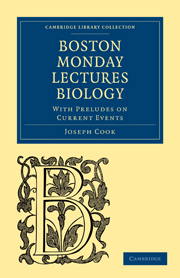Book contents
- Frontmatter
- INTRODUCTION
- Contents
- LECTURES
- I HUXLEY AND TYNDALL ON EVOLUTION
- II THE CONCESSIONS OF EVOLUTIONISTS
- III THE CONCESSIONS OF EVOLUTIONISTS
- IV THE MICROSCOPE AND MATERIALISM
- V LOTZE, BEALE, AND HUXLEY ON LIVING TISSUES
- VI LIFE, OR MECHANISM—WHICH?
- VII DOES DEATH END ALL? INVOLUTION AND EVOLUTION
- VIII DOES DEATH END ALL? THE NERVES AND THE SOUL
- IX DOES DEATH END ALL? INSTINCT IMMORTAL?
- X DOES DEATH END ALL? BAIN'S MATERIALISM
- XI AUTOMATIC AND INFLUENTIAL NERVES
- XII EMERSON'S VIEWS ON IMMORTALITY
- XIII ULRICI ON THE SPIRITUAL BODY
- INDEX
VII - DOES DEATH END ALL? INVOLUTION AND EVOLUTION
Published online by Cambridge University Press: 05 October 2010
- Frontmatter
- INTRODUCTION
- Contents
- LECTURES
- I HUXLEY AND TYNDALL ON EVOLUTION
- II THE CONCESSIONS OF EVOLUTIONISTS
- III THE CONCESSIONS OF EVOLUTIONISTS
- IV THE MICROSCOPE AND MATERIALISM
- V LOTZE, BEALE, AND HUXLEY ON LIVING TISSUES
- VI LIFE, OR MECHANISM—WHICH?
- VII DOES DEATH END ALL? INVOLUTION AND EVOLUTION
- VIII DOES DEATH END ALL? THE NERVES AND THE SOUL
- IX DOES DEATH END ALL? INSTINCT IMMORTAL?
- X DOES DEATH END ALL? BAIN'S MATERIALISM
- XI AUTOMATIC AND INFLUENTIAL NERVES
- XII EMERSON'S VIEWS ON IMMORTALITY
- XIII ULRICI ON THE SPIRITUAL BODY
- INDEX
Summary
“Die Nothwendigkeit für zwei unvergleichbare Kreise von Erscheinungen zunächst zwei gesonderte Erklärungsgründe zu verlangen, verbot uns jeden Versuch, aus Wirkungen materieller Stoffe, so fern sie materiel sind, das innere Leben als einen selbstverstandlichen Erfolg ableiten zu wollen.”
—Hermann Lotze, Mikrokosmus, I., 186.“Attention to those philosophical questions which underlie all Science, is as rare as it is needful.”
—Professor T. H. Huxley, Contemporary Review, Nov. 1871, p. 443.If the Greeks had possessed the microscope, they would in all probability never have been thrown into debate over the famous question of their philosophy, whether the relation of the soul to the body is that of harmony to a harp, or of a rower to a boat. According to the former of these two theories, the music must cease when the harp is broken : according to the latter, the rower may survive, although his boat is destroyed. He may be completely safe, even when his frail vessel, splintered by all the surges and lightnings, rots on the tusks of the reefs, or sinks in the fathomless waste, or dissolves to be blown about the world by the howling seas. In the one case, death does, in the other it does not, end all. Dim as was to the Greeks of Pericles' day the whole field which science has entered with the microscope for the first time in the last fifty years, all their greatest poets and philosophers held that the relation of the soul to the body is that of the rower to a boat.
- Type
- Chapter
- Information
- BiologyWith Preludes on Current Events, pp. 64 - 74Publisher: Cambridge University PressPrint publication year: 2009First published in: 1879



